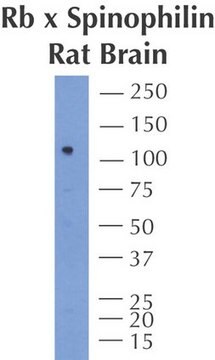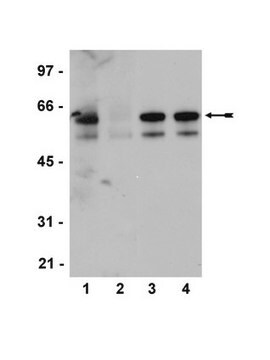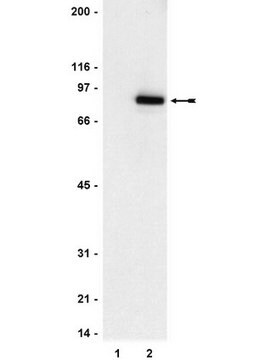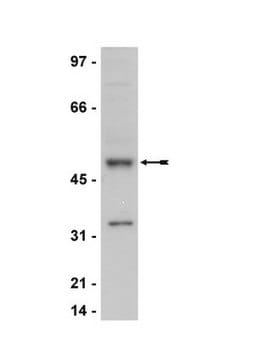06-852
Anti-Spinophilin/Neurabin-II Antibody
Upstate®, from rabbit
Synonym(s):
Protein phosphatase 1 regulatory subunit 9B 3 neurabin II, protein phosphatase 1, regulatory (inhibitor) subunit 9B, protein phosphatase 1, regulatory subunit 9B, protein phosphatase 1, regulatory subunit 9B, spinophilin
About This Item
Recommended Products
biological source
rabbit
Quality Level
antibody form
purified immunoglobulin
antibody product type
primary antibodies
clone
polyclonal
species reactivity
rat
manufacturer/tradename
Upstate®
technique(s)
immunocytochemistry: suitable
immunoprecipitation (IP): suitable
western blot: suitable
isotype
IgG
NCBI accession no.
UniProt accession no.
shipped in
dry ice
target post-translational modification
unmodified
Gene Information
human ... PPP1R9B(84687)
General description
Specificity
Immunogen
Application
4 μg of a previous lot immunoprecipitated Spinophilin/Neurabin-II from 500 μg of rat brain microsomal preparation (Catalog # 12-144).
Neuroscience
Synapse & Synaptic Biology
Neuronal & Glial Markers
Quality
Western Blot Analysis:
0.25-1 μg/mL of this lot detected Spinophilin/Neurabin-II in 20 μg of a rat brain microsomal preparation (Catalog # 12-144).
Target description
Physical form
Storage and Stability
Handling Recommendations:
Upon receipt, and prior to removing the cap, centrifuge the vial and gently mix the solution. Aliquot into microcentrifuge tubes and store at -20°C. Avoid repeated freeze/thaw cycles, which may damage IgG and affect product performance. Note: Variability in freezer temperatures below -20°C may cause glycerolcontaining solutions to become frozen during storage.
Analysis Note
Brain tissue
Other Notes
Legal Information
Disclaimer
Not finding the right product?
Try our Product Selector Tool.
Storage Class Code
10 - Combustible liquids
WGK
WGK 1
Certificates of Analysis (COA)
Search for Certificates of Analysis (COA) by entering the products Lot/Batch Number. Lot and Batch Numbers can be found on a product’s label following the words ‘Lot’ or ‘Batch’.
Already Own This Product?
Find documentation for the products that you have recently purchased in the Document Library.
Our team of scientists has experience in all areas of research including Life Science, Material Science, Chemical Synthesis, Chromatography, Analytical and many others.
Contact Technical Service







